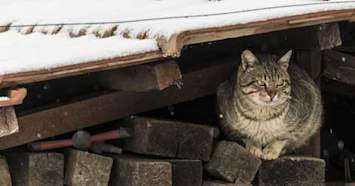
Winter’s frosty paws have us layering up and staying inside – but some of us can’t stay inside, like our feral cat friends. They may not like very much human contact, but I guarantee they like, and need, shelter. With quality shelter, they can survive (and even thrive) during the coldest months.
You can make a feral cat shelter relatively cheaply and easily by following DIY options. But first, here are some general guidelines for all outside cat shelters:
Insulation
Insulation is the most important feature and should be placed right inside the shelter (and other places, depending on design).
Only use dry, loose material that the cats can burrow in. Don’t use blankets or towels that retain moisture
Straw is great for insulation, but straw is NOT hay. Hay is prone to molding, which you absolutely don’t want. Straw is loose and dry – you can find it at home improvement stores, garden centers, & craft stores during certain seasons
Shredded newspaper is a great option
Styrofoam peanuts stuffed into a plastic bag & placed in a pillowcase works for an added layer on top of the straw
Construction and Placement
No matter the design, sound construction and placement is key. If the shelter isn’t safe, dry, and sturdy, it is no good.
Make shelter the absolute smallest possible while still meeting the needs of the cat(s). If you have more than two cats, build multiple small shelters instead of one large one. The smaller it is, the warmer they stay
Place your shelter away from threatening dogs or other predators (including humans who may not want them around). Use fencing or place the shelter up high and conceal it
Face the opening of the shelter towards a wall with just enough room for a cat (but not bigger animals) to get in and out. The opening itself should be as small as possible – about five or six inches is big enough for most cats – & it should be several inches higher than the ground to prevent water from coming in or blocking the entrance
Keep the shelter off the ground. You can use two by fours, cinder blocks, bricks, or anything solid, stable, & weatherproof. Stuff straw between the ground and the shelter for added insulation
Make sure it’s waterproof. If you have doubts, make the back of the shelter slightly higher than the front & drill a small hole in the bottom or side of it. That way, water will be able to drain out
If the shelter is light, weigh it down with weights under the insulation &/or on top of the roof
To add warmth, create a door out of heavy plastic, vinyl, or rubber (think mud flap, doggy door, etc.) to hang over the opening – make sure they can push it easily.
Important: Don’t include the covering to start – leave it open until they come & go regularly, then add it
Another option is to situate two shelters across from one another with the openings facing each other & secure a board on top of them. It not only gives added protection from the elements & predators, but also weighs the shelters down
Design Options and DIY Instructions
The web is packed with different ideas and options. Here are a few links that guide you through making different styles of feral cat winter housing: